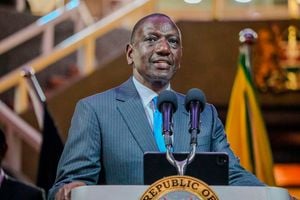
There were irregularities in the debt, which now exceeded Sh11 trillion.
Auditor-General Nancy Gathungu has raised questions over the legality and usefulness of the Sh1.4 trillion commercial loans contracted by the government without consulting the Attorney-General and applying them to unintended projects.
Ms Gathungu made the revelations in a special audit before parliament that shows that the 39 loans, procured externally in a span of 11 years - July 1, 2010, to December 31, 2021, expose the government to risks of entering into agreements whose terms are unfavourable.
The debts, which have since escalated the country’s debt stock beyond Sh11 trillion, were fraught with irregularities that include being used for unintended function and questionable payment of commitment fees.
The audit of September 2022, specifically puts the National Treasury’s Public Debt Management Office (PDMO), vested with the responsibility of seeking the legal opinion of the Attorney-General before loans are procured, at the scene of crime.
Already the questionable procurement of the debts is being investigated by the Directorate of Criminal Investigations (DCI) with individuals at the National Treasury having recorded statements.
“In the absence of the legal opinion ahead of contracting of the loans, the country is at risk of entering into agreements whose terms may be unfavourable,” the special audit says noting that this is critical “to save the government from undue costs on commitment fees.”
The Attorney-General is the government's legal advisor.
Section 5.4.2.1 of the 2020 Public Debt Borrowing Policy (PDBP) states; “debt management office shall seek the legal opinions from the Attorney General on loan negotiations and liaising with implementation agencies to ensure that conditions precedents are fulfilled in time.”
The audit shows that 26 of the 39 loans contracted externally during the period under review, did not have the opinion of the Attorney-General.
The loans’ proceeds were denominated in the USD, Euro and South Korean Won (KRW) and of the Sh1.4 trillion received, only Sh1.1 trillion hit the Consolidated Fund (CF).
Of the 39 loans, 16 were US dollar-denominated with a value of Sh1.074 trillion, 22 in Euros worth Sh288.18 billion and one in KRW currency worth Sh102.55 billion.
The audit shows that 13 of these loans were syndicated loans and sovereign bonds while 26 were project funding loans for the implementation of specific government projects.
The PFM Act establishes the PDMO as a directorate at the National Treasury with the responsibility to minimize the cost of public debt management and borrowing over the long-term, taking account of risk, and promoting development of market institutions for government debt securities.
The PDMO also has the responsibility to ensure the sharing of the benefits and costs of public debt between the current and future generations.
PDMO is further entrusted with the responsibility of loan negotiations and liaising with implementation agencies “to fulfil the conditions precedents in a timely manner.”
“This way, the costs of borrowing are minimized through the avoidance of unnecessary commitment fees,” the audit says as it fingered the National Treasury for not carrying out periodic reconciliations of its records against those of the creditors.
Article 206 establishes a Consolidated Fund into which shall be paid all money raised or received by or on behalf of the national government, except money that is “reasonably excluded from the fund by law.”
The Article states that monies excluded from CF shall be payable into another public fund established for a specific purpose or may under the law be retained by the state organ “that received it for the purpose of defraying the expenses of the state organ.”
The purpose of ensuring loans procured by the government are paid into CF was so as to subject the monies to checks and balances in terms of the requisite approval by parliament and authorization by the Controller of Budget (CoB) before the funds are withdrawn.
This is critical in ensuring that they are applied only for intended projects. However, in 2014, MPs amended the PFM Act to give the National Treasury Cabinet Secretary the sweeping powers to operate the CF over and above what is stipulated in the constitution.
“The CS shall ensure that the proceeds of any loan raised under this Act are paid into the CF or into any other public fund established by the national government or any of its entities as the CS may determine in accordance with regulations approved by Parliament,” reads section 50 (7) of the PFM Act.
Nominated MP John Mbadi, who chairs the Public Accounts Committee (PAC) of the National Assembly says that while his committee will have a session with the National Treasury on the special audit, he did not shy away from referring to the loans as odious debts.
“Odious debts are debts that have no benefit to the people and can be viewed as a liability to the creditor. So far not much has been said of the benefit of these loans to the country,” says Mr Mbadi noting; “as a committee, we will dig deeper.”
According to governance expert Mr Barasa Nyukuri, the amendment is unconstitutional as it allows the CS National Treasury to give leeway to creditors from whom the government has contracted the loans to disburse the loan amounts directly to contractors and suppliers including those domiciled out of the country.
“You cannot amend the constitution through an Act of Parliament,” says Mr Nyukuri.
“This amendment allowed individuals the avenue to negotiate for higher commissions effectively increasing the cost of loans in high interest rates that are eventually passed on to Kenyans,” says Mr Nyukuri.
But even as Mr Nyukuri spoke, the audit established that although the Sh1.13 trillion being proceeds from the 13 syndicated loans and sovereign bonds had been received in the CF, there was no evidence that it had been applied “exclusively to finance development expenditure.”
Section 15 (2) (c) of the Public Finance Management (PFM) Act stipulates that over the medium term, the national government’s borrowings shall be used only for the purpose of financing development expenditure and not for recurrent expenditure.
“It was noted that once the loan proceeds have been received in the CF, the monies are utilized for normal government expenditure that is falling due at the time of receipt of funds,” the audit states adding; “no schedule is maintained on the expenditure of the loan proceeds.”
The audit shows that interviews with the PDMO directorate revealed that funds flow for project financing could take the form of revenue in which the loan proceeds have to be deposited into CF and transferred to the implementing agency project account through the respective parent ministry.
While at the CF, the funds could be treated as Appropriations in Aid (AIA), which means, the creditor or lender pays directly for the expenditure incurred by the project to the contractor or supplier.
In the AIA arrangement, the auditors established that once the payment is made by the creditor to the contractor or supplier, PDMO is notified for the purposes of recording in the system.







